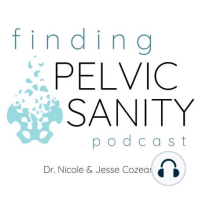31 min listen

What is interstitial cystitis (IC) and how is it diagnosed?
What is interstitial cystitis (IC) and how is it diagnosed?
ratings:
Length:
16 minutes
Released:
Feb 7, 2024
Format:
Podcast episode
Description
Interstitial cystitis (IC) is a scary and incredibly misunderstood diagnosis. You may have also heard terms like ‘painful bladder syndrome’ or ‘bladder pain syndrome’ as well. We want to shed some light on what IC is, how it’s diagnosed and what you can do about it!Definition of IC: Interstitial cystitis is defined by the presence of two symptoms in the absence of any other explanation (like a UTI or bladder cancer). It’s:Pain or pressure we perceive to be related to the bladder, and Urinary urgency or frequencySymptoms of IC: In addition to the hallmark symptoms of bladder pain and urinary urgency/frequency, people often have other related issues. These can include painful intercourse, low back pain, having to go to the bathroom at night (nocturia), pain with sitting or exercise, constipation and other pelvic health symptoms. Do I really have interstitial cystitis? IC is a diagnosis of exclusion, which means it’s only diagnosed by ruling out other things (like bladder cancer or a UTI). There’s no test that can confirm you have IC (including a cystoscopy). If you have the symptoms above - pelvic pain perceived to be related to the bladder and urinary urgency/frequency - you can be diagnosed with IC just by the symptoms.Importantly, the IC diagnosis doesn’t tell you anything about WHY you have the symptoms or WHAT the best treatment option will be for you!Physical Therapy for Interstitial Cystitis. The muscles and nerves of the pelvic floor can be responsible for every symptom of IC. They can cause the bladder pain and urinary symptoms. They are also the cause of seemingly unrelated symptoms like painful intercourse, low back pain, hip pain or constipation. It’s the reason symptoms are often worse when sitting or after strenuous exercise, and why they can get better after gentle stretching or a warm bath.Physical therapy is the highest recommended treatment (Grade ‘A’) by the American Urological Association. It’s literally the first recommendation you should get from a urologist when IC is suspected. We hope this gives you a good overview of the condition, and we want to leave you with the first lines of The IC Solution (link): “Thousands of people with IC live healthy, happy and pain-free lives - and so can you!”About UsDr. Nicole and Jesse Cozean are the founders of PelvicSanity Physical Therapy (www.pelvicsanity.com) in Southern California. The clinic has helped thousands of patients in the Orange County, CA area and hundreds from around the world with a remote consultation and Out of Town Program.They co-authored The IC Solution and Nicole created The IC Roadmap online course to provide the most accurate, up-to-date information for those with interstitial cystitis. They run the Finding Pelvic Sanity Facebook group for a supportive online community for anyone dealing with pelvic health issues.Nicole has also created courses and trained thousands of pelvic PTs to provide better care through her work with Pelvic PT Rising (www.pelvicptrising.com). Subscribe to the podcast Follow @pelvicsanity for great info! Join the Finding PelvicSanity support group Check out www.pelvicsanity.com for additional help! And as always, we hope this has helped you find just a bit of pelvic sanity!
Released:
Feb 7, 2024
Format:
Podcast episode
Titles in the series (17)
How do I find a great pelvic physical therapist? by Finding Pelvic Sanity